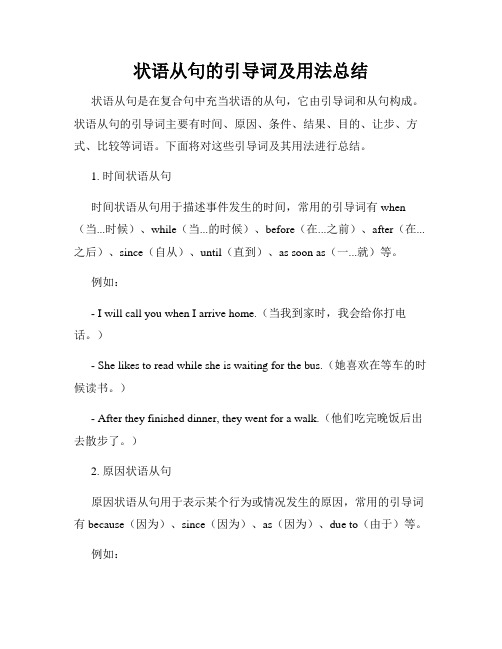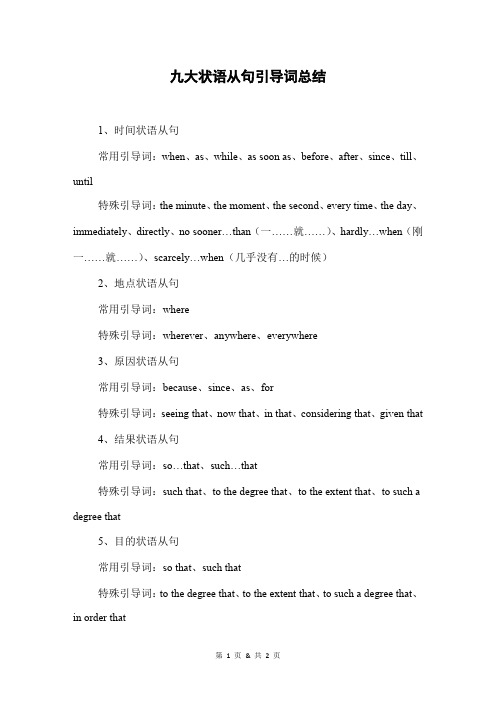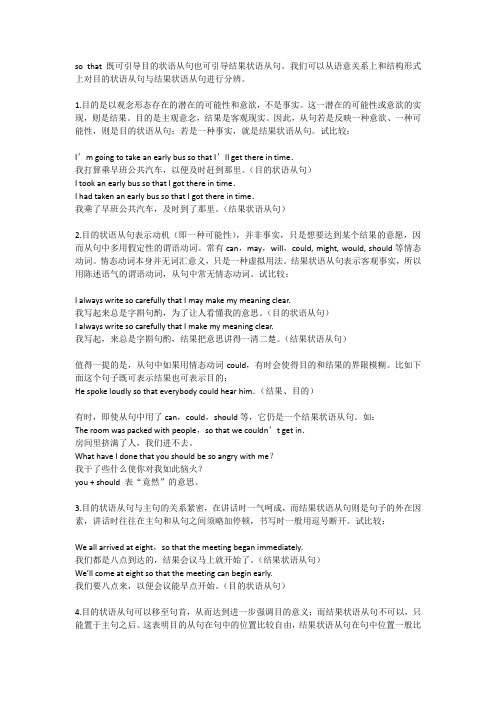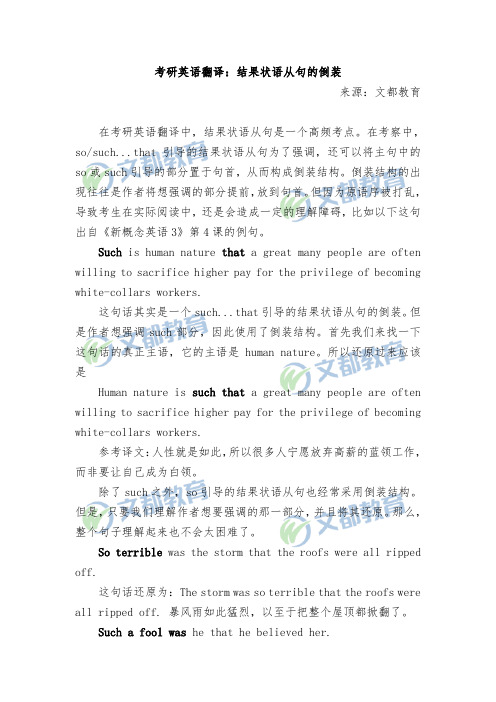引导结果状语从句
状语从句的引导词及语序要点

状语从句的引导词及语序要点状语从句在复杂句中起到修饰主句的作用,常用于表示时间、原因、条件、结果、目的、方式等关系。
了解状语从句的引导词及语序要点对于拼写准确的表达和语法正确性是至关重要的。
本文将介绍一些常见的状语从句引导词以及它们的语序要点。
1. 时间状语从句时间状语从句用来说明主句动作发生的时间。
常见的引导词有:when,while,as,before,after,since,until等。
引导词同主句的句子时态保持一致。
例如:- When I arrived home, it started raining.(当我回到家时,开始下雨。
)2. 原因状语从句原因状语从句用来说明主句动作的原因。
常见的引导词有:because,since,as,for等。
主句和从句之间的时态可以根据上下文要求进行变化。
例如:- She couldn't attend the meeting because she was ill.(她没能参加会议是因为她病了。
)3. 条件状语从句条件状语从句用来说明主句动作发生的条件。
常见的引导词有:if,unless,as long as,provided that等。
主句如果是一般将来时,从句可以使用现在时表示将来。
例如:- If it rains tomorrow, we will stay at home.(如果明天下雨,我们会呆在家里。
)4. 结果状语从句结果状语从句用来说明主句动作产生的结果。
常见的引导词有:so,such...that,therefore等。
引导词so用于表示肯定的结果,such...that用于表示如此的结果。
例如:- He ran so fast that he won the race.(他跑得太快,结果赢得了比赛。
)5. 目的状语从句目的状语从句用来说明主句动作的目的。
常见的引导词有:so that,in order that等。
目的状语从句中常用so that来表示目的,in order that表示较强调目的。
状语从句的引导词及用法总结

状语从句的引导词及用法总结状语从句是在复合句中充当状语的从句,它由引导词和从句构成。
状语从句的引导词主要有时间、原因、条件、结果、目的、让步、方式、比较等词语。
下面将对这些引导词及其用法进行总结。
1. 时间状语从句时间状语从句用于描述事件发生的时间,常用的引导词有when (当...时候)、while(当...的时候)、before(在...之前)、after(在...之后)、since(自从)、until(直到)、as soon as(一...就)等。
例如:- I will call you when I arrive home.(当我到家时,我会给你打电话。
)- She likes to read while she is waiting for the bus.(她喜欢在等车的时候读书。
)- After they finished dinner, they went for a walk.(他们吃完晚饭后出去散步了。
)2. 原因状语从句原因状语从句用于表示某个行为或情况发生的原因,常用的引导词有because(因为)、since(因为)、as(因为)、due to(由于)等。
例如:- She couldn't come to the party because she was sick.(她因为生病所以不能来参加派对。
)- He couldn't concentrate on his work since he was tired.(他因为累了无法集中精力工作。
)- As it was raining heavily, we decided to stay at home.(由于下着大雨,我们决定待在家里。
)3. 条件状语从句条件状语从句用于描述某种条件下的情况,常用的引导词有if(如果)、unless(除非)、as long as(只要)、provided/providing that(只要)、in case(万一)等。
九大状语从句引导词总结

九大状语从句引导词总结
1、时间状语从句
常用引导词:when、as、while、as soon as、before、after、since、till、until
特殊引导词:the minute、the moment、the second、every time、the day、immediately、directly、no sooner…than(一……就……)、hardly…when(刚一……就……)、scarcely…when(几乎没有…的时候)
2、地点状语从句
常用引导词:where
特殊引导词:wherever、anywhere、everywhere
3、原因状语从句
常用引导词:because、since、as、for
特殊引导词:seeing that、now that、in that、considering that、given that
4、结果状语从句
常用引导词:so…that、such…that
特殊引导词:such that、to the degree that、to the extent that、to such a degree that
5、目的状语从句
常用引导词:so that、such that
特殊引导词:to the degree that、to the extent that、to such a degree that、in order that
第 1 页& 共 2 页。
so that既可引导目的状语从句也可引导结果状语从句

so that既可引导目的状语从句也可引导结果状语从句。
我们可以从语意关系上和结构形式上对目的状语从句与结果状语从句进行分辨。
1.目的是以观念形态存在的潜在的可能性和意欲,不是事实。
这一潜在的可能性或意欲的实现,则是结果。
目的是主观意念,结果是客观现实。
因此,从句若是反映一种意欲、一种可能性,则是目的状语从句;若是一种事实,就是结果状语从句。
试比较:I’m going to take an early bus so that I’ll get there in time.我打算乘早班公共汽车,以便及时赶到那里。
(目的状语从句)I took an early bus so that I got there in time.I had taken an early bus so that I got there in time.我乘了早班公共汽车,及时到了那里。
(结果状语从句)2.目的状语从句表示动机(即一种可能性),并非事实,只是想要达到某个结果的意愿,因而从句中多用假定性的谓语动词。
常有can,may,will,could, might, would, should等情态动词。
情态动词本身并无词汇意义,只是一种虚拟用法。
结果状语从句表示客观事实,所以用陈述语气的谓语动词,从句中常无情态动词。
试比较:I always write so carefully that I may make my meaning clear.我写起来总是字斟句酌,为了让人看懂我的意思。
(目的状语从句)I always write so carefully that I make my meaning clear.我写起,来总是字斟句酌,结果把意思讲得一清二楚。
(结果状语从句)值得一提的是,从句中如果用情态动词could,有时会使得目的和结果的界限模糊。
比如下面这个句子既可表示结果也可表示目的:He spoke loudly so that everybody could hear him.(结果、目的)有时,即使从句中用了can,could,should等,它仍是一个结果状语从句。
原因结果目的状语从句讲解和练习和答案

状语从句总结一、原因状语从句1原因状语从句通常由because, since, as, for引导;2because表示直接原因,语气最强;because引导的原因状语从句多放在主句之后;回答由why提出的问题,只能用because;此外,because和so不能同用在一个句子里;例如:------Why aren’t going there------Because I don’t want to.since引导原因状语从句,相当于now that,意思是“因为……,既然……, 鉴于……”;例如:Since the rain has stopped,let’s go for a walk. 既然雨停了,我们出去散散步吧;as和since语气较弱,一般用来表示明显的原因;由as和since引导的原因状语从居多放在句首;例如:As he has no car, he can’t get there easily.Since we have no money, we can’t buy it.3for表示所说的理由是一种补充说明,for引导的从句一般不放在句子的开头;如:I decided to stop and have lunch, for I was feeling quite hungry.练习:I was late for class yesterday _______ there was something wrong with my bike.He took off his coat _______ he felt hot.you can’t answer the question, I’ll ask someone else.二、结果状语从句1结果状语从句由so…that, such…that, so that引导;2so…that语such...that可以互换;在由so...that引导的结果状语从句中,so是副词,与形容词连用;其结构是: “...so + 形容词副词+ that + 从句”;例如:He was so glad that he couldn’t say a word.Mother lives so far away that we hardly ever几乎不,从来不see her.在由such…that引导的结果状语从句中,such是形容词,它修饰的可以是单数或复数可数名词,也可以是不可数名词;其结构是: “...such +a / an + 形容词+名词+ that + 从句”;例如:It was such a hot day that nobody wanted to do anything.He had such long arms that he could almost touch the ceiling.天花板有时上述两种结构是可以互换的;例如:It was such a wonderful film that all of us wanted to see it again.=The film was so wonderful that all of us wanted to see it again.3如果名词前由many, much, little, few等词修饰时,只能用so, 不用such;例如:Soon there were so many deer that they ate up all the wild roses.He has so little time that he can’t go to the cinema with you.4如果主从句的主语相同,并且从句是否定的形式,可以用too...to...句型转化;例如:He was so excited that he couldn't go to sleep that night. = He was too excited to go to sleep.5如果主从句的主语相同,但从句是肯定的形式,可以用adj.+ enough替换;例如:He is so old that he could go to school. = He is old enough to go to school.他够大了,可以去上学;练习:It is ___ hot in the room ___ we have to go out for a walk.It was a wonderful movie all of us wanted to see it again.There were little water in the bottle the bird couldn’t reach it..三、目的状语从句1目的状语从句通常由so that, in order that为了,以便引导;例如:We started early so that we could catch the first train.We used the computer in order that we might save time.2so that可引导目的状语从句,此时可用to或in order to替换,将其改为简单句;例如:He got up early so that he could get to school on time.=He got up earlyin order to get to school on time.3so that既可引导目的状语从句,又可引导结果状语从句;区别这两种从句的办法有两个:1目的状语从句里往往带有情态动词can, could, may, might等;2从意思上看,目的状语从句往往表示的目的很明确;例如:Speak clearly so that they may understand you. 目的状语从句Jack is badly ill so that he has to rest. 结果状语从句练习:I hurried I wouldn't be late for class.We should go by bus ___ we can get there earlier.May I sit nearer I can see more clearly4 补充:so as to…肯定结构eg. He got up early so as to catch the early train.so as not to…否定结构eg.He got up early so as not to miss the early train.to…eg. He got up early to catch the early train.in order that …eg. He got up early in order that he could catch the early train.in order to…eg. He got up early in order to catch the early train.Translateso that 以便;为了他阅读更多书,以便他能知道更多知识;我们努力学习是为了我们能有一个好的未来我起得早是为了能赶上早一点的班车;请打开窗户以便我们能呼吸新鲜空气;你现在一定要走是为了不迟到;小男孩节省每一个硬币是为了他能在母亲节给他妈妈买一份礼物;她在网上购买了一部手机以便她能打电话;说得清楚些,使得他们能听懂你的意思.拿近一些,好让我看得更清楚些;我们现在就准备好,等父亲一来我们就可以走了;so...that... 如此太……以致……我太累了,以致我一吃完晚饭就去睡觉了;她太漂亮了以致很多人喜欢她;咖啡太热了以致于我现在不能喝;她如此年轻以致她不能照顾好她自己;男孩跑得太快了以致我不能追上他;他太饿了以致他不能说一个字;男人太强壮了以致他可以抬起这个重箱子;箱子太轻了以致他能背起它;他病得很厉害,今天无法上学;这个小孩以前经常撒谎,以至于现在没有人相信他;她很伤心以至于她伤心地哭了;那门太小了,以至于这只熊走不进去;Translate answersso that 以便;为了他阅读更多书,以便他能知道更多知识; He reads more books so that he can lean more knowledge.我们努力学习是为了我们能有一个好的未来We study hard so that we can have a good future.我起得早是为了能赶上早一点的班车; I got up early so that I could catch the early bus.请打开窗户以便我们能呼吸新鲜空气; Please open the window so that we can breathe fresh air.你现在一定要走是为了不迟到; You must go now so that you won't be late.小男孩节省每一个硬币是为了他能在母亲节给他妈妈买一份礼物;The little boy saved every coin so that he could buy his mother a present on Mother's day.她在网上购买了一部手机以便她能打电话; I’ll give you all the facts so that you can judge for your self.说得清楚些,使得他们能听懂你的意思. Speak clearly, so that they may understand you.拿近一些,好让我看得更清楚些; Bring it nearer so that I may see it better.我们现在就准备好,等父亲一来我们就可以走了; Let's get ready now so that we can leave when Father comes.so...that... 如此太……以致……我太累了,以致我一吃完晚饭就去睡觉了; I was so tired that I went to bed as soon as I had supper.她太漂亮了以致很多人喜欢她; She is so beautiful that many people like her.咖啡太热了以致于我现在不能喝; He coffee is so hot that I can't drink now.她如此年轻以致她不能照顾好她自己; She is so young that she can't look after herself.男孩跑得太快了以致我不能追上他; The boy ran so fast that I couldn't catch him.他太饿了以致他不能说一个字; He was so angry that he couldn't say a word.男人太强壮了以致他可以抬起这个重箱子; The man is so strong that he can lift the heavy box.箱子太轻了以致他能背起它; The box is so light that he can carry it.他病得很厉害,今天无法上学; He was so ill that he couldn't go to school today.这个小孩以前经常撒谎,以至于现在没有人相信他; The child often told lies so that no one believes him now. 她很伤心以至于她伤心地哭了; She is so angry that she cried sadly.那门太小了,以至于这只熊走不进去; The door is so small that the bear can’t go inside.强化练习一、单项选择;1.We’ll stay at home if it ______ tomorrow.A.rain B.rains C.is raining D.will rain2.We didn’t go home _____ we finished the work.A.since B.until C.because D.though3.She ______ when I went to see her.A.is reading B.have read C.was reading D.reads 4._____ the rain stops, we’ll set off for the statio n.A.Before B.Unless C.As soon as D.Though 5.She looks forward every spring to ____ the flower-lined garden.A.visit B.paying a visit C.walk in D.walking in 6.Mr. White hoped he ______ China the next year.A.would visit B.will visit C.visited D.has visited 7.I told him that the sun ______ in the east.A.rises B.rose C.has risen D.was rising 8.She was _____ tired _____ she could not move an inch.A.so, that B.such, that C.very, that D.so, as9.He was sentenced to death _____ what he had stolen from the bank.A.that B.since C.because D.because of10.I didn’t know what ______.A.was the matter B.is the matter C.the matter was D.the matter is11.I couldn’t agree with ______ at the meeting.A.that you said B.which you said C.what did you say D.what you said 12.The bad man ran away to avoid _______ and was finally put into prison.A.seeing B.to be seen C.being seen D.to be caught 13.Everyone except Jim and Jack ______.A.know who is he B.know who he is C.knows who is he D.knows who he is 15.It is ten years ______ I left my hometown.A.since B.If C.whether D.until 16.Could you tell us ______ Mr. Brown lives in Room 202A.that B.where C.until D.if17.I learned a little Russian _____ I was at middle school.A.though B.although C.as if D.when18.I don’t know ______ or not it will rain tomorrow.A.that B.When C.if D.whether 19.—Why is their classroom so clean and tidy —______ it is cleaned every day.A.Since B.As C.Because D.For20.Can you tell me ______ is going to give us a talk next MondayA.who B.whom C.whose D.what21. Please answer the question in a loud enough voice ___ all the class may hear.A. so, thatB. orC. in order thatD. and22. Lift it up___I may see it.A. thoughB. so thatC. asD. than23. I hurried___I wouldn't be late for class.A. soB. so thatC. ifD. unless24. We should go by bus ___ we can get there earlier.A. as soon asB. whereC. in order thatD. as25. The dictionary is so expensive ___ I can't buy it.A. becauseB. whenC. thatD. if26. I got there ___ late ___ I didn't see him.A. too; toB. such; thatC. so; thatD. so; as27. It is ___ hot in the room ___ we have to go out for a walk.A. such; thatB. so; thatC. as; asD. such; as28. He has___ an interesting book that we want to read it.A. soB. suchC. the sameD. asdidn't go to see the film yesterday ___ she was ill.A. becauseB. butC. untilD. if30. He took off his coat _______ he felt hot.A. becauseB. asC. ifD. since31. The lady was fat that she was not fit for this skirt.A. tooB. asC. suchD. so32. Our PE teacher walks we can’t catch up with him.A. so quick thatB. too quickly thatC. so quickly thatD. too quickly that33. Mrs. Green is that she often gives candies to the children.A. so a nice ladyB. such a nice ladyC. a so nice ladyD. too nice a lady 答案:1-5 BBCCD 6-10 AAADA 11-15 DCDBA 16-20 DDDCA21-25 C B B C C 25-30 C B B A A 31- D C B。
so 引导并列句

"So" 通常用来引导结果状语从句,表示因果关系。
当一个句子以"so" 开头时,它表示某个行动或情况导致的结果。
这里有一个例子:
If you study hard, so you will pass the exam.(如果你努力学习,那么你将会通过考试。
)
在这个例子中,“so” 引导的结果状语从句表示,努力学习的行动将导致通过考试的结果。
此外,"so" 还可以引导其他类型的句子,如:
1. 并列句:用于连接两个或多个具有相似性质或内容的句子。
If it rains, so we will stay at home.(如果下雨,那么我们就待在家里。
)
2. 转折句:表示对比或相反的情况。
She is tall, so he is short.(她很高,所以他还很矮。
)
3. 条件句:表示在特定条件下发生的动作或情况。
If it's sunny, so we will go to the park.(如果天气晴朗,那么我们就去公园。
)。
目的状语从句和结果状语从句

目的状语从句常见引导目的状语从句的连词有:so that, in order that或that.目的状语从句中常含有情态动词,如:may/might, could/can等。
例:I turned off the TV in order that my roommate could study in peace and quiet.I spoke slowly and clearly so that/in order that the audience could understand me.目的状语从句一般位于主句之后,但若要强调目的状语从句,可将so that或in order that引导的从句置于句首。
目的状语从句的化简In order that, so that, that对应的不定式结构为in order to do, so as to do, to do.例:I arrived at the cinema early so as not to miss the beginning of the film.In order to可放于句末、句首。
So as to 不能置于句首。
例:In order to get a better view, we climbed high.直接用动词不定式to do来表目的例:To acquire knowledge, one must study; but to acquire wisdom,one must observe.In order for sb to do sth例:I spoke slowly and clearly in order for the audience to understand me.The teacher raised his voice in order for the students in the back to hear more clearly.结果状语从句常用的引导结果状语从句的连词有:s o……that, such……that, so that, such that.结果状语从句要放在主句之后,而不能提到句首。
考研英语翻译:结果状语从句的倒装

考研英语翻译:结果状语从句的倒装来源:文都教育在考研英语翻译中,结果状语从句是一个高频考点。
在考察中,so/such...that引导的结果状语从句为了强调,还可以将主句中的so或such引导的部分置于句首,从而构成倒装结构。
倒装结构的出现往往是作者将想强调的部分提前,放到句首。
但因为原语序被打乱,导致考生在实际阅读中,还是会造成一定的理解障碍,比如以下这句出自《新概念英语3》第4课的例句。
Such is human nature that a great many people are often willing to sacrifice higher pay for the privilege of becoming white-collars workers.这句话其实是一个such...that引导的结果状语从句的倒装。
但是作者想强调such部分,因此使用了倒装结构。
首先我们来找一下这句话的真正主语,它的主语是human nature。
所以还原过来应该是Human nature is such that a great many people are often willing to sacrifice higher pay for the privilege of becoming white-collars workers.参考译文:人性就是如此,所以很多人宁愿放弃高薪的蓝领工作,而非要让自己成为白领。
除了such之外,so引导的结果状语从句也经常采用倒装结构。
但是,只要我们理解作者想要强调的那一部分,并且将其还原。
那么,整个句子理解起来也不会太困难了。
So terrible was the storm that the roofs were all ripped off.这句话还原为:The storm was so terrible that the roofs were all ripped off. 暴风雨如此猛烈,以至于把整个屋顶都掀翻了。
- 1、下载文档前请自行甄别文档内容的完整性,平台不提供额外的编辑、内容补充、找答案等附加服务。
- 2、"仅部分预览"的文档,不可在线预览部分如存在完整性等问题,可反馈申请退款(可完整预览的文档不适用该条件!)。
- 3、如文档侵犯您的权益,请联系客服反馈,我们会尽快为您处理(人工客服工作时间:9:00-18:30)。
引导结果状语从句
引导结果状语从句是英语语法中的一个重要部分,它可以用来表达某个行动或事件的结果。
在英语中,结果状语从句通常由“so that”、“such that”、“that”等引导。
下面是一些常见的结果状语从句,它们可以帮助我们更好地理解这个语法结构。
1. So that
“So that”是一个常用的结果状语从句引导词,它通常用来表达目的或目标。
例如:
- I woke up early so that I could catch the first train.
- She studied hard so that she could pass the exam.
- He saved money so that he could buy a new car.
在这些例子中,“so that”引导的结果状语从句表达了一个目的或目标,即为了做某事而采取行动。
2. Such that
“Such that”也是一个常用的结果状语从句引导词,它通常用来表达某种程度或程度的影响。
例如:
- The weather was so bad that we had to cancel the picnic.
- The noise was so loud that I couldn't concentrate on my work.
- The food was so delicious that I went back for seconds.
在这些例子中,“such that”引导的结果状语从句表达了某种程度或程度的影响,即某种情况或事件对另一种情况或事件产生的影响。
3. That
“That”是一个常用的结果状语从句引导词,它通常用来表达某种结果或后果。
例如:
- He was so tired that he fell asleep on the couch.
- The car was so old that it broke down on the way to the airport.
- The movie was so boring that I left before it was over.
在这些例子中,“that”引导的结果状语从句表达了某种结果或后果,即某种情况或事件导致了另一种情况或事件的发生。
4. In order that
“In order that”是一个比较正式的结果状语从句引导词,它通常用来表达目的或目标。
例如:
- He worked hard in order that he could get a promotion.
- She saved money in order that she could buy a new house.
- They studied together in order that they could pass the exam.
在这些例子中,“in order that”引导的结果状语从句表达了一个目的或目标,即为了做某事而采取行动。
5. So
“So”是一个简单的结果状语从句引导词,它通常用来表达某种结果或后果。
例如:
- He was so happy that he couldn't stop smiling.
- The cake was so delicious that everyone wanted seconds.
- The traffic was so bad that we were late for the meeting.
在这些例子中,“so”引导的结果状语从句表达了某种结果或后果,即某种情况或事件导致了另一种情况或事件的发生。
6. Such
“Such”是一个比较正式的结果状语从句引导词,它通常用来表达某种程度或程度的影响。
例如:
- The weather was such that we had to cancel the outdoor concert. - The noise was such that I couldn't hear myself think.
- The food was such that I had to ask for the recipe.
在这些例子中,“such”引导的结果状语从句表达了某种程度或程度的影响,即某种情况或事件对另一种情况或事件产生的影响。
7. Therefore
“Therefore”是一个比较正式的结果状语从句引导词,它通常用来表达某种结果或后果。
例如:
- He worked hard, therefore he was promoted.
- She saved money, therefore she could buy a new car.
- They studied together, therefore they passed the exam.
在这些例子中,“therefore”引导的结果状语从句表达了某种结果或后果,即某种情况或事件导致了另一种情况或事件的发生。
8. Hence
“Hence”是一个比较正式的结果状语从句引导词,它通常用来表达某种结果或后果。
例如:
- He was tired, hence he went to bed early.
- The car was old, hence it broke down on the way to the airport.
- The movie was boring, hence I left before it was over.
在这些例子中,“hence”引导的结果状语从句表达了某种结果或后果,即某种情况或事件导致了另一种情况或事件的发生。
9. Consequently
“Consequently”是一个比较正式的结果状语从句引导词,它通常用来表达某种结果或后果。
例如:
- He worked hard, consequently he was promoted.
- She saved money, consequently she could buy a new car.
- They studied together, consequently they passed the exam.
在这些例子中,“consequently”引导的结果状语从句表达了某种结果或后果,即某种情况或事件导致了另一种情况或事件的发生。
10. As a result
“As a result”是一个比较正式的结果状语从句引导词,它通常用来表达某种结果或后果。
例如:
- He worked hard, as a result he was promoted.
- She saved money, as a result she could buy a new car.
- They studied together, as a result they passed the exam.
在这些例子中,“as a result”引导的结果状语从句表达了某种结果或后果,即某种情况或事件导致了另一种情况或事件的发生。
结果状语从句是英语语法中的一个重要部分,它可以帮助我们更好地表达某个行动或事件的结果。
在使用结果状语从句时,我们需要注意引导词的使用和从句的结构,以确保表达的意思准确无误。
